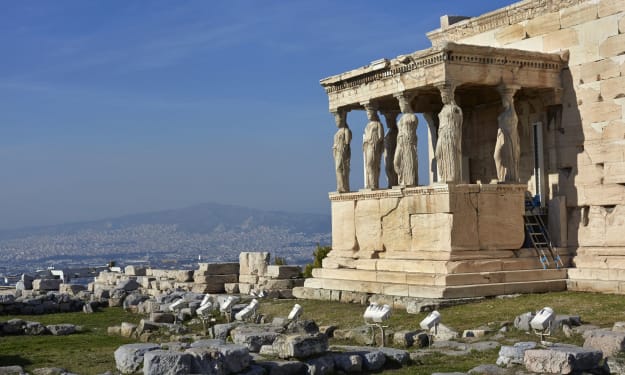Plato
Foundations of western Philosophy

Plato was a Greek philosopher who lived in Athens in the 4th century BCE. He was a student of Socrates and a teacher of Aristotle, and he is widely regarded as one of the greatest philosophers in the Western tradition. Plato was a prolific writer and many of his dialogues, including "The Republic" and "The Symposium," continue to be widely read and studied.
Plato's philosophy can be divided into two main areas of interest: metaphysics and ethics. In terms of metaphysics, Plato believed in the existence of a realm of Forms or Ideas, which he saw as the ultimate reality and the source of all truth. He believed that the physical world was only a shadow or imitation of the world of Forms, and that the only way to attain true knowledge was through an understanding of the Forms.
Plato's idea of Forms was a central aspect of his philosophy and metaphysics. In his dialogue "The Republic," Plato wrote, "We can only say that the Forms are the cause of all things and the source of all truth."
The Forms, according to Plato, were perfect and unchanging, and they represented the essence of objects in the physical world. For example, the Form of "Beauty" was the perfect, unchanging essence of all beautiful things in the physical world. He believed that it was only through an understanding of the Forms that one could attain true knowledge and understanding.
Plato saw the Forms as more real than the physical world and argued that the physical world was merely a reflection of the Forms. In "The Republic," he wrote, "The Forms are the only things that can be truly known and that’s why knowledge of the Forms is the only real knowledge."
Plato's idea of Forms has been the subject of much debate and discussion in the centuries since his death. Some have seen it as a precursor to the idea of abstract concepts in modern philosophy, while others have criticized it as being too idealistic and divorced from the physical world. Regardless of the debates, however, Plato's idea of Forms remains an important aspect of his philosophy and continues to be studied and discussed to this day.
Plato's ethical philosophy was based on the idea that the ultimate goal of human life was to achieve the Good, which he saw as the highest form of happiness and fulfillment. He believed that the Good could only be attained through a life of virtue and wisdom, and that the pursuit of the Good was the most important goal in life.
In terms of ethics, Plato believed in the idea of the "philosopher-king." He argued that the only way to achieve a just society was through the rule of philosopher-kings, who would use their knowledge of the Forms to govern justly and wisely. He believed that such rulers would be guided by the Good and that their rule would lead to a society in which the highest good of all citizens was the primary goal.
Plato also believed in the idea of the immortality of the soul. He argued that the soul was separate from the body and that it continued to exist after death. He believed that the soul was immortal because it was a part of the world of Forms and that it could only be fulfilled through a life of virtue and wisdom.
In terms of education, Plato believed that education was the key to attaining wisdom and to achieving a just society. He argued that education was not just about learning facts and acquiring knowledge, but rather it was about transforming the soul and leading a person to a life of virtue and wisdom. He believed that the role of education was to help people understand the Forms and to help them lead virtuous lives.
In conclusion, Plato's philosophy can be seen as a comprehensive and holistic system of thought that covers a wide range of topics, including metaphysics, ethics, politics, and education. He believed in the existence of a realm of Forms and that the ultimate goal of human life was to achieve the Good. He saw the pursuit of wisdom and virtue as the key to a just society and to a fulfilling life, and he believed that education was the key to attaining wisdom. Plato's ideas continue to be widely read and studied and his legacy continues to influence Western thought and culture.
About the Creator
Atlas the Kid
Mad4tlas.bandcamp.com
Musician - Recording Artist -
Digital Artist - Writer - Political Organizer
🎶Now Streaming Everywhere 🎵
💿 Rain 11/19/21🔊
💿 NoFearEP 2/19/21🔊
💿 Pete 4/30/21🔊






Comments
There are no comments for this story
Be the first to respond and start the conversation.